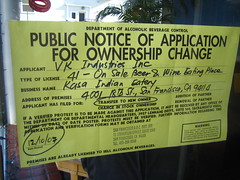Some time ago I wrote about a couple of methods to grant execution permission on stored procedures, on Sql Server 2000.
Now I had to write something similar, but the scope was to change ownership of the objects; after some googling I found this page on support.microsoft.com that lists a good way to do the job... but I modified slightly the code from MS, because I needed the possibility to decide to actually execute the commands or simply print them.
So I added a simple parameter (the third), datatype bit, default 0 (false). When set to 1 (true) will cause the execution of the commands.
Here's the code:
CREATE PROCEDURE [dbo].[chObjOwner]( @usrName varchar(20), @newUsrName varchar(50), @exec bit = 0)
as
-- @usrName is the current user
-- @newUsrName is the new user
set nocount on
declare @uid int -- UID of the user
declare @objName varchar(50) -- Object name owned by user
declare @currObjName varchar(50) -- Checks for existing object owned by new user
declare @outStr nvarchar(256) -- SQL command with 'sp_changeobjectowner'
set @uid = user_id(@usrName)
declare chObjOwnerCur cursor static
for
select name from sysobjects
where 1=1
AND uid = @uid
AND xtype in ( 'P', 'U', 'V')
and name <> 'chObjOwner'
-- category: zero is valid for Stored Procedures... but not for tables
-- and category = 0
open chObjOwnerCur
if @@cursor_rows = 0
begin
print 'Error: No objects owned by ' + @usrName
close chObjOwnerCur
deallocate chObjOwnerCur
return 1
end
fetch next from chObjOwnerCur into @objName
while @@fetch_status = 0
begin
set @currObjName = @newUsrName + '.' + @objName
if (object_id(@currObjName) > 0)
print 'WARNING *** ' + @currObjName + ' already exists ***'
set @outStr = 'sp_changeobjectowner ''' + @usrName + '.' + @objName + ''',''' + @newUsrName + ''''
print @outStr
IF @exec = 1
execute sp_executesql @outStr
--print 'go'
fetch next from chObjOwnerCur into @objName
end
close chObjOwnerCur
deallocate chObjOwnerCur
set nocount off
return 0











No comments:
Post a Comment